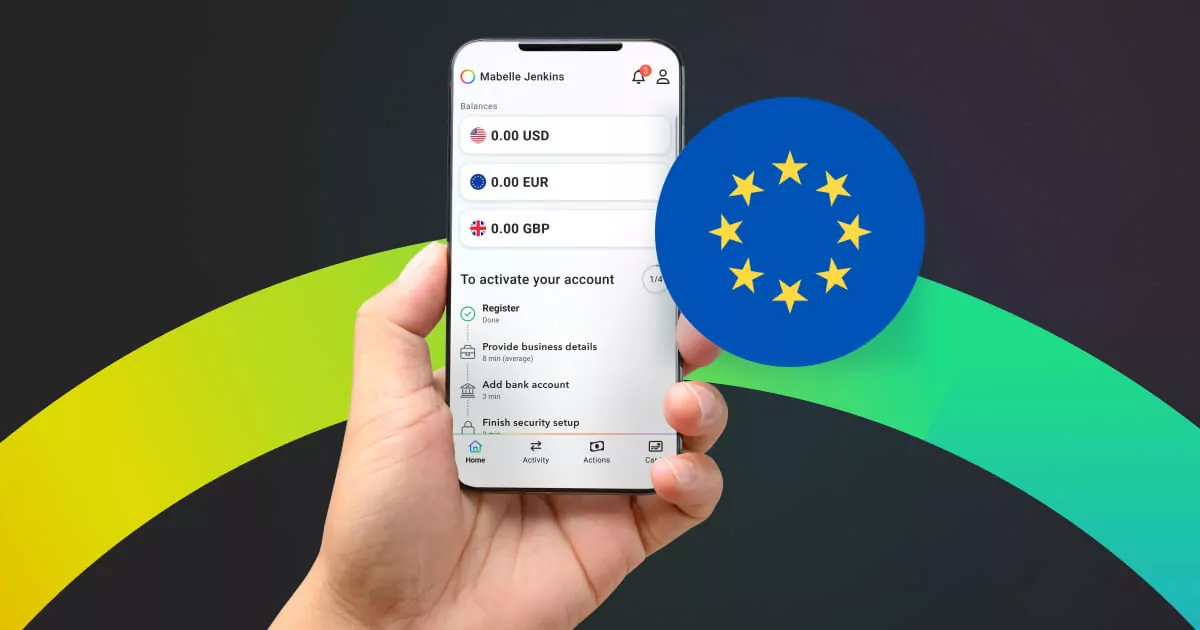HomeResourcesOnline BankingOnline Banking
Simplify Your Business in the EU With a Euro Bank Account
Opening a Euro bank account for your business in the EU can be challenging due to varying banking and regulatory requirements. This guide covers considerations for EU bank accounts and alternative options to simplify the process. Learn about the benefits of having a Euro bank account and streamline your business operations in the EU

What is needed to open a Euro bank account?
Expanding your business into other countries? Are you looking to the European Union (EU) as a possibility? Expansion — new opportunities — can be exciting. But as with any move into a new market in another country there are many considerations, not the least of which is determining how to best receive money from and send payments to those individuals and organsitions with which you do business.
As an individual or a small company located outside the EU, the traditional solution is to establish a business chequeing account in an EU bank. Through your EU bank account, you can pay your EU suppliers via cheque or by wire transfer. Likewise, your EU customers and clients can pay you by cheque, by direct deposit or by wire transfer into your EU bank account.
The difficult part for most small businesses is actually establishing that bank account in the EU.
With 28 different countries within the EU and with each country having its own banking and government regulatory requirements (and of course, its own language), setting up an EU bank account for your business can be challenging at best. Below we describe the various considerations for opening bank accounts in the EU, including alternative options and approaches. However, be prepared to do your legwork and be prepared to do this on a country by country basis. The research involved can seem insurmountable.
What is needed to open an EU bank account?
Like most countries, each country within the EU has controls on how — and if — its banks can establish accounts for non-residents and for businesses located outside the country. This is designed to prevent money laundering (and other international criminal activity).
Regulations may vary not only by specific country within the EU, but by regions within each respective country. All these factors may affect the requirements for opening business accounts for foreign companies.
Furthermore, most commercial banks will have internal policies that govern how they handle accounts from overseas customers — both to comply with law, and to protect the bank against potential fraud or other possible losses. These policies may also be different in each bank and change at any time based upon economic and terrorist activity.
The best approach is to directly contact the bank in the specific country of the EU and the region of that country in which you will be opening the account and ask about their current policies and procedures.
But before we get into the specifics of bank accounts, let’s review the advantages that the EU has to offer. The general intent of the European Union (EU) is to establish a single market in which the trading of goods and services is more standardized across all member states of the EU. With the introduction of a single currency (the euro) combined with standard rules to equalize taxation among EU countries trading barriers and the general cost of doing business is mitigated. In addition, EU residents/citizens are able to more freely move between other member countries, thereby increasing available workforce for businesses. Of course, perhaps the biggest advantage is introducing yourself to the largest international single market in the world.
So what will it take for you to get started? Below we provide an overview of some of the general requirements. Although not intended to be a comprehensive list, we want you to be aware of the most pertinent factors.
- You may need a physical EU business address
Regardless of whether your business dictates the need for a factory or warehouse or office in the EU, you will need to have a physical address, of some sort, to establish your business and your EU bank account. The “of some sort” varies based upon country and the type of business you are formulating and your bank’s specific requirements.
Some countries (such as Germany, Spain and Ireland) require establishing a physical presence and in some cases, hiring of local personnel. This can be accomplished through virtual offices which obviously adds to your monthly overhead.
Many countries allow the use of the offices of an attorney, a Registered Agent, notary, or other specified representative of the company, as accepted by each respective EU country.
- Your business must be registered within an EU country
How you formulate your business will be an overall driving factor for all downstream requirements for setting up a bank account. There are numerous options and they vary from country to country, all 28 of them. Therefore, you must consider the type of business you are formulating for your chosen EU country. These may include, but are not limited to:
- Sole trader (running your own business as an individual or self-employed).
- LLC, Partnership, merchant account, mergers, acquisitions.
- Societas Europaea (SE), a type of public LLC which may offer downstream benefits.
Note that many, but not all, EU countries use a notary system – thereby increasing the time to formulate a business. Germany, Spain, Portugal and Italy utilize a notary system. Some countries require a minimal capital investment which often varies based upon your company formation. Some countries may require proof of specific skills or knowledge, or a business plan. Other factors include evaluating the VAT structure of each country and whether or not there are any additional taxation rules specific to the types of products/services you are buying/selling.
- You may need to open an EU bank account in person
Someone has to present your credentials to the bank when establishing your account. Whether or not you personally need to do so will vary based upon the EU country and the bank itself. You need to contact the bank to determine whether or not they accept authorized representatives, and if so, who is considered an authorized representative.
This is required to verify your identity, and to allow the bank to validate the documents and information needed to open your account. You will need an official photo ID, proof of home or business address, bank statements from your home country bank, and perhaps other verification. Ask the bank for details.
- You will need a tax identification number within an EU country
Upon registration of your business with the appropriate government agency of a specific country, you will be issued a tax identification number, which is required by the bank, and your business, for reporting information to the tax authority of each EU country. Herein lies an example of how the type of business you formulate can affect downstream requirements. If you establish your business as an SE, you can use your company registration in one EU country with other EU countries without having to establish a separate tax identification number.
You need to determine requirements of a specific bank
An authorized representative will need to provide your credentials to the bank. Again, the credentials required will vary by bank and may include the following:
- Personal Identification — official photo (passport) ID, usually 2 are required
- Potentially, a letter of introduction by another bank and/or authorized agent
- Physical address
- Company registration information
- Tax identification number
But when doing business within the EU one of the biggest considerations (and challenges) is whether or not establishing a business in one country will READILY allow you to open a business bank account in another country. This may explain why there are a plethora of companies that provide consultancy specific to establishing a business within the EU.
Again, ask each bank for specific details on what is required.
The truth is, you don’t really need to register for an eu bank account
There are other options to the traditional approaches of establishing a bank account within the EU in order to conduct your business there. For example, if you already have an account with a large international bank that also has banking operations within the EU, they may be able to help you establish an account within the EU, depending on the nature of your existing relationship with the bank.
Using intermediary companies that specialize in these matters can be quite costly. There are firms, based both within and outside the EU, which offer services to foreign companies looking to open an EU bank account. Their fees and services vary widely.
So where do you want to spend your money? A dollar, a pound, a euro, a krone, a peso only goes so far. Whether you work directly with an EU bank or utilize firms to act on your behalf, these approaches have different costs associated to them in terms of both time and money. Any merely finding the right firm or bank for you could take a vast amount of research.
Perhaps the simplest option for individuals, freelancers, and small businesses outside the EU are global payment platforms such as Payoneer, which doesn’t involve opening an EU bank account at all.
Payoneer, for example, provides a fast payment path between buyer and seller, across borders and currencies, with relatively simple setup, entirely online – no matter where you are located. Both buyers and sellers can register themselves on the Payoneer service in a matter of hours, in some 200 countries worldwide, and be exchanging in a matter of days — for far less than the wire transfer fees or other tariffs charged by conventional banks.
Payoneer’s Global Payment Service gives users access to receiving accounts in various countries, enabling them to receive money easily from clients and companies abroad. If you’re doing business in the EU and need to receive euros, Payoneer offers a EU receiving account which will allow you to do so easily.
The Payoneer approach provides many features and benefits, all of which mitigate the costs associated with other approaches, in terms of both time and money.
- Payoneer allows you to apply for your account on-line, negating the need for you to physically be in an EU country to open an account.
- Payoneer only asks for necessary identification documentation only, simplifying your entire process (and saving you the time and energy of having to research what documentation is required for your chosen country).
- Payoneer provides per transaction pricing, reducing your overall cost. Compare this to the many tariffs you are likely to incur with the more traditional approaches.
- Payoneer provides a solution that is quickly established within hours, not days or weeks that it may take with more traditional approaches of establishing an address in another country, establishing a business in another country, and setting up a bank account in another country.
- Paynoeer provides services for businesses to pay VAT obligations directly from their account, saving SMEs thousands of euros annually in fees and steep FX rates.
- In addition to EUR receiving accounts, Paynoeer provides local receiving accounts in USD, GBP, JPY and MXN for businesses at no additional cost.
Related resources
Latest articles
-
Kazakhstan payment landscape: The best ways to send and receive money internationally
The right payment solution for your business saves both time and money. In this infographic, we explore the major players in Kazakhstan’s payment ecosystem for international transfers.
-
Defying the odds: How Ukrainian businesses thrive during war
One year post-war, Ukraine’s businesses adapt and thrive amidst adversity. Entrepreneurs showcase resilience, reflecting national tenacity. Many diversify, venturing into e-commerce and digital realms. Despite hurdles, 44% of SMBs aim for growth, with 36% hiring. Their grit underscores Ukraine’s enduring spirit amid challenges.
-
How to Pay International Freelancers?
Interested in working with freelancers, worldwide? Making international payments to freelancers and independent contractors around the world doesn’t have to be a headache with Payoneer. Learn how to use Payoneer to pay overseas freelancers while saving on international transaction fees and without jumping through hoops.
-
What Are The Best Payment Options For Freelancers?
Freelancers offer flexibility and expertise without the overhead of traditional employees. However, processing invoices and payments for international freelancers can be a complex and time-consuming process. To work with freelancers effectively, it’s crucial to understand the available payment options for freelancers and how to best keep on top of accounting and invoicing.
-
An 8-point Checklist for Finding the Best Payment Provider
There’s huge potential to expand into ASEAN markets. But only for online sellers that accept local payment methods. Finding a trusted payment solution can be a worry and a challenge. Use this checklist to vet potential payment partners. With the right payment support, the sky’s the limit!
-
How to bill your international clients
Want to learn how to bill international clients when you’re based in the Philippines? In this article we spoke to three leading business owners who shared their tips to working successful international work. Learn how they collect payments and more below.














